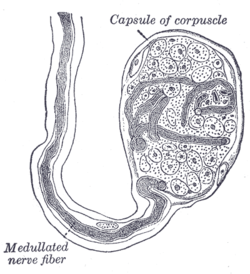The bulboid corpuscles (end-bulbs of Krause, Krause corpuscles) are cutaneous receptors in the human body and that of other animals.
| Bulboid corpuscle | |
|---|---|
 End-bulb of Krause. | |
| Details | |
| Identifiers | |
| Latin | corpuscula bulboideum |
| FMA | 83603 |
| Anatomical terminology | |
The end-bulbs of Krause were named after the German anatomist Wilhelm Krause (1833–1910).[1][2]
Function
editThe end-bulbs of Krause were thought to be thermoreceptors, sensing cold temperatures, but in early research their function remained unknown.[3] Recently optogenetic studies revealed their role in sexual stimulation and mating behavior in mice:
"Optogenetic activation of male Krause corpuscle afferent terminals evoked penile erection, while genetic ablation of Krause corpuscles impaired intromission and ejaculation of males as well as reduced sexual receptivity of females. Thus, Krause corpuscles, which are particularly dense in the clitoris, are vibrotactile sensors crucial for normal sexual behavior."[4]
Structure
editThey are minute cylindrical or oval bodies, consisting of a capsule formed by the expansion of the connective-tissue sheath of a medullated fiber, and containing a soft semifluid core in which the axis-cylinder terminates either in a bulbous extremity or in a coiled-up plexiform mass.
Location
editEnd-bulbs are found in the conjunctiva of the eye (where they are spheroidal in shape in humans, but cylindrical in most other animals), in the mucous membrane of the lips and tongue, and in the epineurium of nerve trunks.
Krause corpuscles are found in the penis and the clitoris[5] and sometimes are referred to as genital corpuscles;[6] in these situations they have a mulberry-like appearance, being constricted by connective-tissue septa into from two to six knob-like masses.[citation needed]
In the synovial membranes of certain joints, e. g., those of the fingers, rounded or oval end-bulbs occur, and are designated articular end-bulbs.
References
editThis article incorporates text in the public domain from page 1060 of the 20th edition of Gray's Anatomy (1918)
- ^ synd/2425 at Who Named It?
- ^ Krause, W. (1860). Die terminalen Körperchen der einfach sensiblen Nerven [The terminal corpuscles of the simple sensory nerves] (in German). Hannover. OCLC 488510746, 14844647, 224361622.
{{cite book}}: CS1 maint: location missing publisher (link)[page needed] - ^ Gartner, Leslie P. (2015). Textbook of Histology. Elsevier Health Sciences. ISBN 978-0-323-39068-2. OCLC 938048317.[page needed]
- ^ Qi, Lijun; Iskols, Michael; Handler, Annie; Ginty, David D. (2023). "Krause corpuscles of the genitalia are vibrotactile sensors required for normal sexual behavior". bioRxiv. doi:10.1101/2023.06.14.545006. PMC 10312780. PMID 37398085.
- ^ Qi, L., Iskols, M., Greenberg, R.S. et al. Krause corpuscles are genital vibrotactile sensors for sexual behaviours. Nature (2024). Krause corpuscles are genital vibrotactile sensors for sexual behaviours, Nature, June 19, 2024
- ^ Cold, C.J.; Taylor, J.R. (27 May 2002). "The prepuce". BJU International. 83 (S1): 34–44. doi:10.1046/j.1464-410x.1999.0830s1034.x. PMID 10349413. S2CID 30559310.